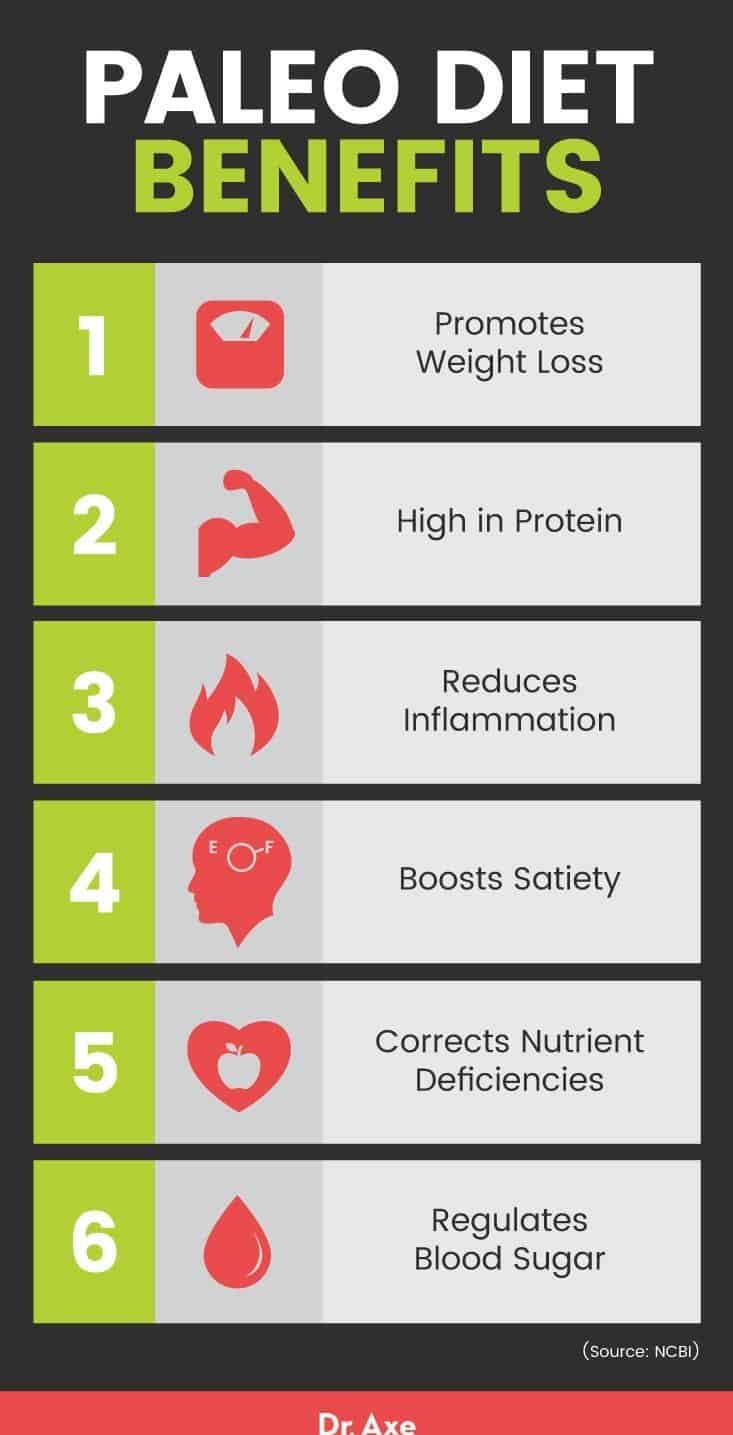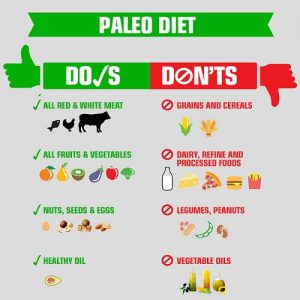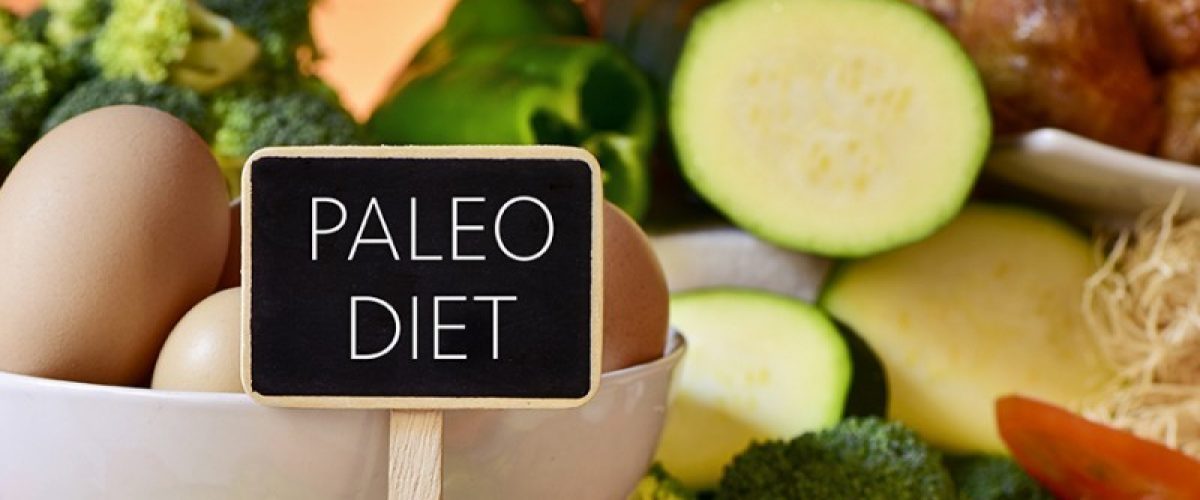Discover the 5 key benefits of the Paleo Diet. From weight loss to improved blood sugar control and increased energy levels, find out why this diet is worth trying!
Are you tired of fad diets that promise quick results but leave you feeling unsatisfied and deprived? Well, look no further than the Paleo diet! This eating plan focuses on consuming whole, unprocessed foods that our ancestors would have eaten during the Paleolithic era. By emulating their diet, you can reap a variety of benefits, including improved digestion, weight loss, increased energy levels, stabilized blood sugar, and reduced inflammation. With its emphasis on natural, nutrient-dense foods, the Paleo diet offers a sustainable and enjoyable way to nourish your body. So, why not give it a try and experience these amazing benefits for yourself?

Weight Loss
Curbs appetite
The Paleo diet, also known as the Caveman diet, has been gaining popularity for its numerous health benefits. One of the key benefits of following this diet is its ability to curb your appetite, making it easier to lose weight. By eliminating processed and refined foods, which are often high in calories and low in nutrients, the Paleo diet focuses on whole, unprocessed foods that are more filling and satisfying. Foods like lean meats, fish, fruits, vegetables, and healthy fats keep you feeling fuller for longer, reducing the temptation to snack or overeat.
Reduces calorie intake
In addition to curbing your appetite, the Paleo diet naturally reduces your calorie intake. This is because the diet emphasizes nutrient-dense foods that are lower in calories compared to processed foods. By cutting out refined sugars, grains, and processed snacks, you automatically eliminate a large portion of empty calories from your diet. Instead, you consume foods that are high in protein and fiber, which help keep you full and satisfied. This calorie reduction can lead to weight loss over time, as your body starts to burn stored fat for energy instead.
Promotes fat burning
Another way the Paleo diet aids in weight loss is by promoting fat burning. The diet encourages the consumption of healthy fats such as avocados, nuts, and olive oil, while limiting the intake of unhealthy fats found in processed foods. By providing your body with a healthy balance of fats, protein, and carbohydrates, the Paleo diet helps optimize your metabolism and encourages your body to burn stored fat for fuel. This can lead to a decrease in body fat percentage and an increase in lean muscle mass, resulting in a more toned and fit physique.

Improved Blood Sugar Control
Stabilizes blood sugar levels
Maintaining stable blood sugar levels is crucial for overall health, especially for individuals at risk of or managing diabetes. The Paleo diet can be particularly beneficial in this regard, as it eliminates foods that cause rapid spikes in blood sugar levels. Refined carbohydrates, such as white bread, pasta, and sugary snacks, are quickly absorbed by the body, causing blood sugar levels to skyrocket. In contrast, the Paleo diet focuses on whole, unprocessed foods that have a lower glycemic index, meaning they cause a slower and more controlled rise in blood sugar. By consuming these foods, you can better regulate your blood sugar levels and reduce the risk of experiencing fluctuations that can lead to insulin resistance and type 2 diabetes.
Reduces insulin resistance
Insulin resistance occurs when the body’s cells become less responsive to the action of insulin, a hormone that helps regulate blood sugar levels. When insulin resistance develops, blood sugar cannot enter the cells effectively, leading to high blood sugar levels and an increased risk of type 2 diabetes. Fortunately, following a Paleo diet can help reduce insulin resistance. By avoiding processed and refined foods that contribute to insulin resistance, and instead focusing on whole foods that are nutrient-dense, the Paleo diet promotes insulin sensitivity. This can improve blood sugar control and reduce the risk of developing diabetes, making it an excellent dietary choice for those concerned about their blood sugar levels.
May help prevent type 2 diabetes
Type 2 diabetes is a chronic condition characterized by high blood sugar levels and insulin resistance. Making lifestyle changes, such as adopting a Paleo diet, can significantly reduce the risk of developing this disease. The Paleo diet’s emphasis on whole, unprocessed foods and the elimination of processed carbohydrates has been shown to improve insulin sensitivity and overall blood sugar control. This, in turn, can help prevent the onset of type 2 diabetes or manage the condition more effectively. It is important to note that consulting with a healthcare professional or registered dietitian is crucial for those with pre-existing conditions or medication management, as they can offer personalized advice and guidance.

Increased Energy Levels
Provides sustained energy
One of the notable benefits of following the Paleo diet is the increase in energy levels it provides. By eliminating processed foods that are often high in refined sugars and unhealthy fats, the Paleo diet stabilizes blood sugar levels, preventing energy crashes commonly associated with consuming sugary snacks or processed carbohydrates. Instead, the diet focuses on whole foods that provide sustained energy throughout the day. Lean meats, fish, fruits, vegetables, and healthy fats are all rich in essential nutrients and slow-digesting carbohydrates, which help keep you energized for longer periods.
Eliminates energy crashes
Unlike other diets that promote quick-fix solutions and cause subsequent energy crashes, the Paleo diet avoids the rollercoaster effect on energy levels. By removing highly processed and sugary foods, which cause blood sugar spikes followed by crashes, the Paleo diet provides a more balanced and consistent supply of energy throughout the day. This means no more mid-afternoon slumps or relying on caffeine to stay alert. Instead, by fueling your body with nourishing foods, you can maintain a steady energy level, enhancing your productivity and overall well-being.
Enhances athletic performance
For individuals who engage in regular exercise or lead an active lifestyle, the Paleo diet can have a positive impact on athletic performance. By prioritizing nutrient-dense foods and avoiding inflammatory foods like refined grains and processed snacks, the Paleo diet supports optimal recovery and muscle growth. The inclusion of lean proteins, such as chicken, turkey, and fish, provides the building blocks necessary for repair and strengthening of muscles. Additionally, the healthy fats from sources like avocado and nuts provide a source of sustained energy during workouts. By following a Paleo diet, athletes can enhance their athletic performance, improve endurance, and reduce inflammation, leading to better overall fitness outcomes.

Improved Digestion
Eliminates processed foods
One of the main causes of digestive discomfort and bloating is the consumption of processed foods. These foods often contain additives, preservatives, artificial sweeteners, and unhealthy fats that can disrupt the natural balance of the gut. The Paleo diet eliminates processed foods entirely, focusing on whole, unprocessed ingredients that are easier for the body to digest. By avoiding processed foods, you reduce the risk of digestive issues such as bloating, gas, and stomach discomfort. Instead, you nourish your body with nutrient-dense foods that support optimal digestive health.
Increases fiber intake
Incorporating an adequate amount of fiber into your diet is essential for a healthy digestive system. The Paleo diet, with its emphasis on fruits, vegetables, nuts, and seeds, naturally increases your fiber intake. Fiber adds bulk to the stool, promoting regular bowel movements and preventing constipation. It also acts as food for the beneficial bacteria in your gut, supporting a healthy microbiome. By consuming a variety of fiber-rich foods, such as leafy greens, berries, and almonds, you can improve your digestion and maintain a healthy gut environment.
Reduces bloating and digestive discomfort
Bloating and digestive discomfort can significantly impact your quality of life. The Paleo diet’s focus on whole, unprocessed foods can help alleviate these issues. By eliminating foods that are difficult to digest, such as processed grains and dairy products, and instead choosing foods that your body is better equipped to handle, you can reduce bloating and discomfort. The Paleo diet’s emphasis on nutrient-dense foods also provides the necessary vitamins and minerals for a healthy digestive system, supporting the overall well-being of your gut.

Better Nutrient Absorption
Higher intake of vitamins and minerals
A key aspect of the Paleo diet is its emphasis on whole, unprocessed foods that are naturally rich in vitamins and minerals. By removing processed foods that often have limited nutrient content, the Paleo diet ensures a higher intake of essential nutrients. Nutrient-dense foods such as fruits, vegetables, lean meats, and nuts provide a wide array of vitamins and minerals necessary for overall health. These vitamins and minerals play vital roles in supporting immune function, promoting cell growth and repair, and maintaining optimal organ function. By following the Paleo diet, you can increase your nutrient intake and optimize your body’s ability to absorb and utilize these important compounds.
Improved gut health
The health of your gut has a significant impact on your overall well-being. A healthy gut supports proper digestion, boosts the immune system, and even influences mood and mental health. The Paleo diet can contribute to improved gut health by eliminating foods that can disrupt the balance of beneficial bacteria in the gut. By avoiding processed foods, refined sugars, and additives, and instead consuming whole, unprocessed foods, you provide your gut with the necessary nutrients to thrive. The fiber-rich foods in the Paleo diet also act as prebiotics, which feed the beneficial bacteria in your gut, promoting a healthy microbiome and optimal gut function.
Enhances nutrient absorption
Consuming a nutrient-rich diet is not only about the quantity of vitamins and minerals you consume but also your body’s ability to absorb and utilize them efficiently. The Paleo diet supports better nutrient absorption due to its focus on whole foods and the elimination of anti-nutrients present in processed foods. Anti-nutrients, such as phytic acid found in grains and legumes, can hinder the absorption of certain minerals like iron and zinc. The Paleo diet’s restriction of these anti-nutrients, combined with its emphasis on nutrient-dense foods, ensures that your body can absorb and utilize the essential vitamins and minerals necessary for optimal health.
In conclusion, the Paleo diet offers a range of benefits that extend beyond just weight loss. By curbing appetite, reducing calorie intake, and promoting fat burning, it can help individuals achieve and maintain a healthy weight. Additionally, the Paleo diet’s impact on blood sugar control and insulin resistance make it a valuable tool for reducing the risk of type 2 diabetes. The increase in energy levels, improved digestion, and better nutrient absorption further contribute to overall health and well-being. By adopting the Paleo diet and embracing a lifestyle rich in whole, unprocessed foods, you can reap these multitude of benefits and enjoy a healthier, more vibrant life.
